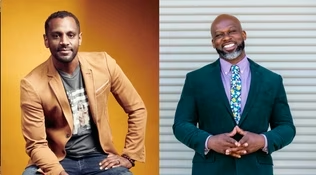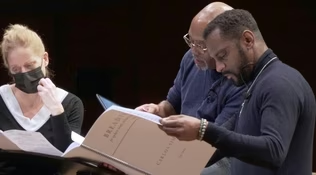This Is Minnesota Orchestra
Principal Tuba Steven Campbell
Clip: Season 5 Episode 6 | 6m 37sVideo has Closed Captions
Principal Tuba Steven Campbell discusses the tuba before performing Marsalis' Concerto.
While preparing for his upcoming performance of Wynton Marsalis' Tuba Concerto, Minnesota Orchestra Principal Tuba Steven Campbell discusses the tuba's starring and supporting roles in the brass section of the Orchestra and what it takes to play this mammoth instrument.
Problems playing video? | Closed Captioning Feedback
Problems playing video? | Closed Captioning Feedback
This Is Minnesota Orchestra is a local public television program presented by TPT
This Is Minnesota Orchestra
Principal Tuba Steven Campbell
Clip: Season 5 Episode 6 | 6m 37sVideo has Closed Captions
While preparing for his upcoming performance of Wynton Marsalis' Tuba Concerto, Minnesota Orchestra Principal Tuba Steven Campbell discusses the tuba's starring and supporting roles in the brass section of the Orchestra and what it takes to play this mammoth instrument.
Problems playing video? | Closed Captioning Feedback
How to Watch This Is Minnesota Orchestra
This Is Minnesota Orchestra is available to stream on pbs.org and the free PBS App, available on iPhone, Apple TV, Android TV, Android smartphones, Amazon Fire TV, Amazon Fire Tablet, Roku, Samsung Smart TV, and Vizio.
Providing Support for PBS.org
Learn Moreabout PBS online sponsorship(tuba plays) - Hey, how are you?
Can I get a breakfast sausage sandwich?
Thanks.
The role of the tuba in the orchestra is multifaceted.
The main role is to be the support of the brass and the full orchestra.
(gentle orchestral music) I know that I'm supposed to be a tuba player, because I love playing the big fat, we call them footballs, whole notes, and I love just laying down that carpet for the orchestra to sit comfortably on.
(gentle orchestral music) Growing up in a musical family was very lucky for me that my dad being a band director and a tuba player, I knew that from a very young age, before the mouthpiece would even fit on my face, that I wanted to play the tuba.
I initially wanted to play tuba and be a band director just like my dad, but I fell in love with playing and went that route.
I do teach at the University of Minnesota and have taught pretty much my whole professional career.
And I think it's really important for musicians to pass the torch, so to speak.
The challenges of playing the tuba day to day when I go to the orchestra or I go to teach, I have soft case that you wear like a backpack.
People look at you funny and they ask you what's on your back, and I used to say, "It's my grandma."
(tuba playing) The sound of the tuba, in some pieces, you might not necessarily notice it's there unless you're really listening for it, but you'd definitely notice it if it was gone.
(orchestral music) The tuba is what I like to call kind of a character actor.
You never know what you're gonna be asked.
Depending on the composer, sometimes you're gonna be an extra horn, sometimes you're fourth trombone, sometimes you're solo tuba.
Depending on how the composer wrote for the instrument.
How the tuba works, it's just like all the other brass instruments.
We just have the mouthpiece and we buzz our lips, buzz right through the mouthpiece, and then the instrument, just like a trumpet, trombone, or french horn works as an amplifier.
(Steven plays tuba) It takes a lot of of wind or air or breath to play the instrument, so I do a lot of breathing exercises.
(Steven inhales and exhales heavily) (gentle orchestral music) So a lot of what we have to do is, especially if I'm thinking about being the foundation of the orchestra, I need to have a straight and very steady tone.
(orchestral music) I have to be able to change my sound, change the color of my sound, to fit in with what's being asked of me by the composer.
(orchestral music) The tuba that I played on the concerto is my F tuba, otherwise known as a bass tuba.
The F tuba has a little bit brighter sound and the contrabass tuba is just a deeper, richer tone.
(Steven plays tuba) A lot of the job that I do in the orchestra, it calls for just this rich, deep tone, and so this is the instrument I use the most in the orchestra.
(gentle orchestral music) Our solo repertoire is lacking, although there is a lot of rep through other tubists in the country that have commissioned a lot of music.
But to put it in perspective, the first concerto I played with the orchestra several years ago, Ray Vaughan Williams Tuba Concerto was written in 1950, and to have a piece written in 2021 by someone such as Wynton Marsalis is just a real honor and I'm really excited and glad to have gotten the opportunity to do it so soon after it was written.
(Steven plays tuba) Every movement is very storytelling.
They're kind of, I think of them more as like little pictures in time.
And the last movement is entitled "In Bird's Basement," Bird meaning Charlie Parker.
So it's all bebop and that's a whole nother language.
I've just been listening, listening, listening to Charlie Parker, Dizzy Gillespie, and so that's been a real fun part of putting this together, is becoming aware of musicians and music that I wasn't aware of before, and just learning how to speak that language.
(gentle orchestral music) You can really tell, when a group is playing for you, that they truly enjoy each other's company.
The Uptown Brass with the members of the orchestra it's Charles Lazarus, Doug Carlsen, Michael Gast, and Doug Wright and myself.
We've been together basically for 18 years, since I've been here.
When we started doing the Common Chords concerts, where we go immerse ourselves into a community, like we just did in Austin, Minnesota, where chamber music groups will go out for three or four days and then the full orchestra comes out and plays.
It's inspiring to perform because rehearsals are just rehearsals.
There is a different feeling to musicians when we play and when you know who you're playing for.
That's really important.
(dramatic orchestral music) I think that people getting to know the musicians that we're just like anybody else, we just happen to do this.
I always like to say, and I remind myself of this, that I have the best seat in the house, so I can sit there and just listen to my colleagues, and I listen to the different lines, whether it's the violas, oboe, basses or harp or even timpani percussion.
I listen to what they're doing.
(gentle orchestral music) And they feed my soul with great music.
(gentle orchestral music) (audience applauding)
Preview: S5 Ep6 | 30s | Brea(d)th by Carlos Simon and Marc Bamuthi Joseph, and Wynton Marsalis’ Tuba Concerto. (30s)
Creating Brea(d)th with Simon and Joseph
Video has Closed Captions
Clip: S5 Ep6 | 7m 4s | The creative partners behind the new piece brea(d)th discuss the process of their work. (7m 4s)
Providing Support for PBS.org
Learn Moreabout PBS online sponsorship
- Arts and Music
The Best of the Joy of Painting with Bob Ross
A pop icon, Bob Ross offers soothing words of wisdom as he paints captivating landscapes.













Support for PBS provided by:
This Is Minnesota Orchestra is a local public television program presented by TPT


